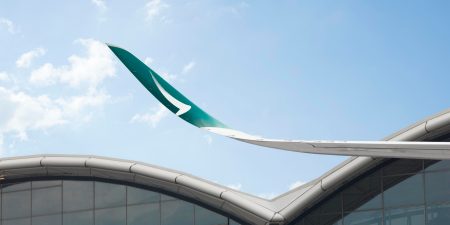
Cathay Pacific releases traffic figures for September 2024
Tuesday 22 October 2024 Cathay Pacific today released its traffic figures for September 2024. In the first nine months of 2024, Cathay Pacific and HK Express together surpassed the 20 million mark for passengers carried, having carried a combined total of over 21 million passengers during the period.
Cathay Pacific carried a total of 1,816,908 passengers in September 2024, an increase of 17.8% compared with September 2023. The month’s revenue passenger kilometres(RPKs) increased 18.4% year on year. Passenger load factor decreased by 2.3 percentage points to 81.4%, while available seat kilometres (ASKs) increased by 21.7% year on year. In the first nine months of 2024, the number of passengers carriedincreased by 28.4% to a total of 16,553,713, against a 34.2% increase in ASKs and a 27.8% increase in RPKs, as compared with the same period for 2023.
The airline carried 133,079 tonnes of cargo in September 2024, an increase of 10.9% compared with September 2023. The month’s cargo revenue tonne kilometres (RFTKs) increased 4.9% year on year. The cargo load factor decreased by 2.4 percentage points to 58.7%, while available cargo tonne kilometres (AFTKs) increased by 9.3% year on year. In the first nine months of 2024, the tonnage increased by 9.9% to a total of 1,103,576 tonnes, against an 8.9% increase in AFTKs and a 3.4% increase in RFTKs, as compared with the same period for 2023.
Travel
Chief Customer and Commercial Officer Lavinia Lau said: “Following the end of the busy peak summer months for leisure travel, September marked the shift to the outbound student travel peak. Student traffic to the United Kingdom continued to rise ahead of the start of the new school year, with our outbound flights from Hong Kong to the United Kingdom achieving high load factors.
“Although September is typically a quieter month for leisure travel, demand picked up towards the end of the month coinciding with the National Day ‘Golden Week’ holiday period. We saw significant demand from Hong Kong to cities in Japan as well as Bangkok, and from the Chinese Mainland to destinations in Southeast Asia, Northeast Asia and Europe around the holidays.
“September also marked the start of the business travel peak season and there was a notable increase in demand for our premium cabins driven by various events, conferences and exhibitions, most notably the Milan and Paris Fashion Weeks. This resulted in September having the highest premium cabin load factor of any month so far in 2024.
Cargo
“Turning to cargo, demand strengthened in September as we moved into the traditional peak season, with tonnage 7% higher than August and 11% above September last year. In terms of cargo carried, we observed an uptick in our Cathay Fresh shipments from South West Pacific, Southeast Asia and North America into Hong Kong and the Chinese Mainland, driven by increased demand during the Mid-Autumn Festival. There was also an increase in shipments through our Cathay Priority solution due to growing demand for time-sensitive shipments to the Americas and Europe. From the Greater Bay Area, e-commerce shipments continued to be the key driver of our export tonnage.
Outlook
“Looking ahead to the coming months, we will be adding more flights and destinations to cater for growing travel demand. We are seeing promising demand for Christmas and we expect bookings during this period to be higher than they were last year.
“In terms of new destinations, Cathay Pacific recently announced the launch of non-stop flights between Hong Kong and Dallas Fort Worth International Airport. The new service, scheduled to commence in April 2025, marks our sixth passenger destination in the United States and eighth in North America, further reinforcing our presence on the continent while bolstering the global connectivity of our home hub, Hong Kong. Additionally, HK Express will be launching new routes to Hualien and Shizuoka in December 2024 and Sendai in January 2025. So far in 2024, we have announced 17 new destinations as a Group, eight of which have commenced services.
“More recently, as part of our continued efforts to further elevate the customer experience, we are delighted to have launched our all-new Business class, Aria Suite, together with our new Premium Economy and refreshed Economy cabins onboard our retrofitted Boeing 777-300ER aircraft. The first of these refreshed aircraft has already entered service on our Beijing route, and will be progressively deployed on other selected regional routes before starting its long-haul operations. The new cabin experience has been thoughtfully designed to maximise our customers’ comfort and enjoyment, and we look forward to welcoming our customers onboard to experience it for themselves.
“In addition, travellers passing through Terminal 1 of Hong Kong International Airport may notice some changes. We are excited to announce progress towards the reopening of Cathay Pacific’s The Bridge lounge next year to meet growing demand and ensure we maintain a premium lounge experience for our eligible customers during the renovation of The Wing lounges. We look forward to sharing more information with our customers in due course.
“For cargo, we expect demand to be robust during the traditional peak season, driven by e-commerce, high-tech and electronic goods from the Chinese Mainland, Southeast Asia and India, as well as perishables from South West Pacific and the Americas. On 26 September 2024, we were honoured to have transported the giant pandas gifted by the Central Government from Chengdu to Hong Kong, and we hope that they are settling in well in their new home.”
The full September figures and glossary are on the following pages.
CATHAY PACIFIC TRAFFIC | SEP 2024 | % Change VS SEP 2023
| Cumulative SEP 2024 | % Change YTD
|
RPK (000) |
|
|
|
|
- Chinese Mainland | 400,703 | 19.4% | 3,489,980 | 44.6% |
- North East Asia | 866,575 | 9.0% | 8,840,097 | 23.9% |
- South East Asia | 932,504 | 32.2% | 8,468,105 | 26.7% |
- South Asia, Middle East & Africa | 483,109 | 24.9% | 4,206,271 | 62.1% |
- South West Pacific | 1,109,612 | 36.4% | 8,877,521 | 34.6% |
- North America | 2,269,560 | 23.5% | 20,217,875 | 43.0% |
- Europe | 1,711,489 | 1.1% | 13,568,019 | 1.4% |
RPK Total (000) | 7,773,554 | 18.4% | 67,667,868 | 27.8% |
Passengers carried | 1,816,908 | 17.8% | 16,553,713 | 28.4% |
Cargo revenue tonne km (000) | 723,324 | 4.9% | 6,137,853 | 3.4% |
Cargo carried (000kg) | 133,079 | 10.9% | 1,103,576 | 9.9% |
Number of flight sectors (passenger and cargo) | 9,782 | 21.0% | 83,221 | 30.4% |
CATHAY PACIFIC CAPACITY | SEP 2024 | % Change VS SEP 2023
| Cumulative SEP 2024 | % Change YTD
|
ASK (000) |
|
|
|
|
- Chinese Mainland | 599,544 | 25.9% | 4,758,538 | 47.4% |
- North East Asia | 1,246,363 | 18.1% | 11,488,249 | 32.1% |
- South East Asia | 1,297,571 | 29.3% | 11,025,049 | 33.6% |
- South Asia, Middle East & Africa | 638,825 | 32.0% | 5,372,672 | 69.5% |
- South West Pacific | 1,274,047 | 38.9% | 11,163,509 | 42.6% |
- North America | 2,619,936 | 28.7% | 22,649,418 | 49.9% |
- Europe | 1,876,845 | -0.1% | 15,092,741 | 4.2% |
ASK Total (000) | 9,553,131 | 21.7% | 81,550,177 | 34.2% |
Passenger load factor | 81.4% | -2.3%pt | 83.0% | -4.1%pt |
Available cargo tonne km (000) | 1,232,714 | 9.3% | 10,362,765 | 8.9% |
Cargo load factor | 58.7% | -2.4%pt | 59.2% | -3.1%pt |
ATK (000) | 2,142,188 | 14.2% | 18,125,697 | 18.4% |
Glossary
Terms:
Available seat kilometres (“ASK”)
Passenger seat capacity, measured in seats available for the carriage of passengers on each sector multiplied by the sector distance.
Available tonne kilometres (“ATK”)
Overall capacity measured in tonnes available for the carriage of passengers, excess baggage, cargo on each sector multiplied by the sector distance.
Available cargo tonne kilometres (“AFTK”)
Cargo capacity measured in tonnes available for the carriage of freight on each sector multiplied by the sector distance.
Revenue passenger kilometres (“RPK”)
Number of passengers carried on each sector multiplied by the sector distance.
Cargo revenue tonne kilometres (“RFTK”)
Amount of cargo, measured in tonnes, carried on each sector multiplied by the sector distance.
Ratio:
Revenue passenger kilometres/
Cargo revenue tonne kilometres
Passenger/Cargo load factor = ---------------------------------------------------------
Available seat kilometres/
Available cargo tonne kilometres









